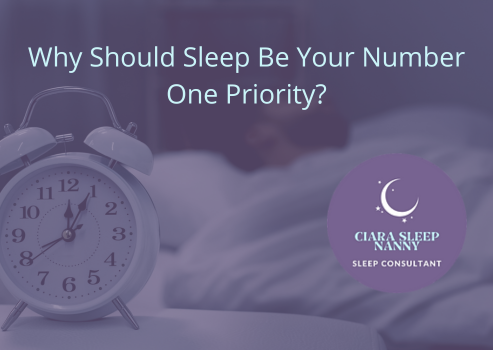Share on social

Why Should Sleep Be Your Number One Priority?
Thursday 18 April 2024
.png?lang=en-GB&ext=.png)
Wellness Era
I think as a society we have well and truly entered our ‘Wellness Era.’ Increasingly people are focused on creating a life based around Wellness. This can be centred around people improving their diet focusing not only on what they eat but other things they consume like what they watch on TV and what they choose to read, exercising more frequently or with more intensity. People are focusing more and more on improving their mental health with daily gratitude practise or journaling. But I would ask you when was the last time you thought about your sleep and how to improve it? Or even why you should improve it?
Make sleep your number one priority!
Yes diet, exercise and mental health are all very important aspects of your daily life. Have you considered how the success of these elements are impacted by your sleep? If you haven't slept very well, how likely are you to get up and go to the gym or work out? Make that well balanced meal or get your journal out? If you are anything like me even after one night of poor sleep I'm hitting that snooze button, reaching for that quick hit sugary treat and I have no idea where my journal is! Matthew Walker a leading sleep researcher has been quoted as saying. ‘Once you drop below 7 hours of sleep, we can start to measure objective impairment in your brain and body. The shorter you sleep the shorter your life.’
5 reasons to consider focusing your attention on improving your sleep today!
1. Improved energy levels
Without a doubt nourishing your body with the right foods can help give you the energy you need to function productively throughout the day. To fully support having adequate energy for a productive day you also need a good night's sleep. Many may believe that when we sleep, we aren't really doing much, and we aren't being productive. However, this could not be further from the truth whilst we are sleeping our body is hard at work completing many functions. Even though while we are sleeping our body is hard at work by simply sleeping, we are also conserving energy. When we fall asleep, and our bodies enter non-REM sleep we enter a state restoration, this stage is closely linked to sleep quality and the maintenance of sleep. If you spend an adequate amount of time asleep and in non-REM sleep, you will have more energy in your waking at hours.
2. Improve your memory
For many a good night's sleep consists of around 8 hours of sleep, cycling through both non-REM and REM sleep and includes the ability to move seamlessly from one sleep cycle to another. Having adequate sleep will have a profound impact on your memory consolidation, this can be broken down into the declarative memory and procedural memory. Declarative memory is closely linked to having adequate non-REM sleep this allows us to remember key facts and statistics. Procedural memory is linked to REM sleep, procedural memory allows us to retrieve the information necessary to perform a learned skill for example, riding a bike or cooking something without a recipe. There is increasing evidence which suggests there is a strong link between poor sleep and the likelihood of developing Alzheimer's. The research suggests that the amyloid protein found in the brain of those suffering from Alzheimer's impacts the sleep-wake cycle impacting on sleep quality, this can impact on your ability to store memories.
3. Helps to maintain weight
As I'm sure most people are aware that our weight fluctuates greatly throughout the day by up to 5 to 6 lbs. Many women will also see monthly fluctuations in their weight closely linked to their monthly cycles. When you are sleep deprived this can impact the regulation of your hormones which govern your appetite. When you are lacking in sleep you are much more likely to not only consume more calories, some studies suggest you could consume up to 3 times the calories you need, you're also more likely to consume foods that are sugary, salty and carb heavy. Two hormones which help regulate our appetite are leptin and ghrelin. Leptin signals the body that we have had enough to eat, and ghrelin will send signals to your body that you need to consume more. When we are sleep derived the body will decrease its production of leptin and increase production of ghrelin. The reason for this is that to be for survival, animals with not often deprive themselves of sleep unless there is a need. One of the most basic needs for survival is food. When we are sleep deprived the brain can perceive the threat of lack of food causing the body to produce more ghrelin driving us to consume more calories. It the modern world it is not necessary to forage or hunt for food but rather go to the cupboard or fridge or even the nearest drive through, it becomes much easier to
4. Improve your immunity
In this post COVID world, living with immunity debt linked to global restrictions imposed on people including social distancing, increased hand washing and the sanitation of surfaces, this has reduced our contact with any pathogens that can cause illness or help built our immunity to certain illnesses. A strong immune system is essential, to help protect our bodies from germs that can make us ill. Our immune systems consist of organs, cells and proteins. When your immune system is functioning at optimal strength, we don’t even notice it is there. When it does not function as well as it should we are given a stark reminder of just how import it is. Studies have shown that those who sleep 8 hours or more are three times less likely to get a cold than those who sleep less than 7 hours. This is linked to a reduction in the production of infection fighting antibodies when we don’t get enough sleep. When we get enough sleep our immune system can recognise and react to threats to the immune system making it much less likely we will become ill and increase the likelihood we will recover quicker.
5. Reduce stress
One of the reasons cited most for lack of sleep is stress. Unsurprisingly one of the best techniques for managing stress is good sleep. When you have a problem which is causing you to be stressed and you share this problem with someone, a common piece of advice is, ‘Sleep on it, it will seem better in the morning.’ When you have slept on the problem you often feel better in the morning, or you are more likely to find a solution. But why does sleeping on it help? While we sleep our body will naturally reduce cortisol and other stress hormones this allows you to feel better in the morning by just sleeping on it. When you are well rested it has been shown that you are less likely to lose your calm or have a strong negative reaction to a difficult situation. When we consider what a good night's sleep is we must consider quantity on quality. Stress can impact on both the quality and quantity of your sleep. If you are stressed about something this can cause you to delay sleep. Over thinking right before bed is a common one reason suggested for this, is it may be the first time you have slowed down all day and all the thoughts you have been too busy to think about come to you all at once. These thoughts can also cause you to wake more frequently in the night as the play over and over in your mind. Many people with choose to journal or meditate before bed to help with this.
Focus on sleep to improve all areas of your health.
When you consider why improving and maintaining good sleep quality and quantity should be a top priority, I would encourage you to consider the following quotes. ‘Sleep is the tide that raises all other health boats.’ The knock-on effect of improving sleep is vast many aspects of our life can improve from your ability to recall information or your bodies the ability to fight infection. I have loss count of the number of times I or others will have said things like, ‘who needs sleep anyway’, ‘Sleep is for the weak’ or ‘I will sleep when I’m dead’. Needles to say my view of those sayings have changed drastically since becoming a sleep consultant. Sleep is the number one priority in my household.
Ciara LappinI think as a society we have well and truly entered our ‘Wellness Era.’ Increasingly people are focused on creating a life based around Wellness. This can be centred around people improving their diet focusing not only on what they eat but other things they consume like what they watch on TV and what they choose to read, exercising more frequently or with more intensity. People are focusing more and more on improving their mental health with daily gratitude practise or journaling. But I would ask you when was the last time you thought about your sleep and how to improve it? Or even why you should improve it?
Make sleep your number one priority!
Yes diet, exercise and mental health are all very important aspects of your daily life. Have you considered how the success of these elements are impacted by your sleep? If you haven't slept very well, how likely are you to get up and go to the gym or work out? Make that well balanced meal or get your journal out? If you are anything like me even after one night of poor sleep I'm hitting that snooze button, reaching for that quick hit sugary treat and I have no idea where my journal is! Matthew Walker a leading sleep researcher has been quoted as saying. ‘Once you drop below 7 hours of sleep, we can start to measure objective impairment in your brain and body. The shorter you sleep the shorter your life.’
5 reasons to consider focusing your attention on improving your sleep today!
1. Improved energy levels
Without a doubt nourishing your body with the right foods can help give you the energy you need to function productively throughout the day. To fully support having adequate energy for a productive day you also need a good night's sleep. Many may believe that when we sleep, we aren't really doing much, and we aren't being productive. However, this could not be further from the truth whilst we are sleeping our body is hard at work completing many functions. Even though while we are sleeping our body is hard at work by simply sleeping, we are also conserving energy. When we fall asleep, and our bodies enter non-REM sleep we enter a state restoration, this stage is closely linked to sleep quality and the maintenance of sleep. If you spend an adequate amount of time asleep and in non-REM sleep, you will have more energy in your waking at hours.
2. Improve your memory
For many a good night's sleep consists of around 8 hours of sleep, cycling through both non-REM and REM sleep and includes the ability to move seamlessly from one sleep cycle to another. Having adequate sleep will have a profound impact on your memory consolidation, this can be broken down into the declarative memory and procedural memory. Declarative memory is closely linked to having adequate non-REM sleep this allows us to remember key facts and statistics. Procedural memory is linked to REM sleep, procedural memory allows us to retrieve the information necessary to perform a learned skill for example, riding a bike or cooking something without a recipe. There is increasing evidence which suggests there is a strong link between poor sleep and the likelihood of developing Alzheimer's. The research suggests that the amyloid protein found in the brain of those suffering from Alzheimer's impacts the sleep-wake cycle impacting on sleep quality, this can impact on your ability to store memories.
3. Helps to maintain weight
As I'm sure most people are aware that our weight fluctuates greatly throughout the day by up to 5 to 6 lbs. Many women will also see monthly fluctuations in their weight closely linked to their monthly cycles. When you are sleep deprived this can impact the regulation of your hormones which govern your appetite. When you are lacking in sleep you are much more likely to not only consume more calories, some studies suggest you could consume up to 3 times the calories you need, you're also more likely to consume foods that are sugary, salty and carb heavy. Two hormones which help regulate our appetite are leptin and ghrelin. Leptin signals the body that we have had enough to eat, and ghrelin will send signals to your body that you need to consume more. When we are sleep derived the body will decrease its production of leptin and increase production of ghrelin. The reason for this is that to be for survival, animals with not often deprive themselves of sleep unless there is a need. One of the most basic needs for survival is food. When we are sleep deprived the brain can perceive the threat of lack of food causing the body to produce more ghrelin driving us to consume more calories. It the modern world it is not necessary to forage or hunt for food but rather go to the cupboard or fridge or even the nearest drive through, it becomes much easier to
4. Improve your immunity
In this post COVID world, living with immunity debt linked to global restrictions imposed on people including social distancing, increased hand washing and the sanitation of surfaces, this has reduced our contact with any pathogens that can cause illness or help built our immunity to certain illnesses. A strong immune system is essential, to help protect our bodies from germs that can make us ill. Our immune systems consist of organs, cells and proteins. When your immune system is functioning at optimal strength, we don’t even notice it is there. When it does not function as well as it should we are given a stark reminder of just how import it is. Studies have shown that those who sleep 8 hours or more are three times less likely to get a cold than those who sleep less than 7 hours. This is linked to a reduction in the production of infection fighting antibodies when we don’t get enough sleep. When we get enough sleep our immune system can recognise and react to threats to the immune system making it much less likely we will become ill and increase the likelihood we will recover quicker.
5. Reduce stress
One of the reasons cited most for lack of sleep is stress. Unsurprisingly one of the best techniques for managing stress is good sleep. When you have a problem which is causing you to be stressed and you share this problem with someone, a common piece of advice is, ‘Sleep on it, it will seem better in the morning.’ When you have slept on the problem you often feel better in the morning, or you are more likely to find a solution. But why does sleeping on it help? While we sleep our body will naturally reduce cortisol and other stress hormones this allows you to feel better in the morning by just sleeping on it. When you are well rested it has been shown that you are less likely to lose your calm or have a strong negative reaction to a difficult situation. When we consider what a good night's sleep is we must consider quantity on quality. Stress can impact on both the quality and quantity of your sleep. If you are stressed about something this can cause you to delay sleep. Over thinking right before bed is a common one reason suggested for this, is it may be the first time you have slowed down all day and all the thoughts you have been too busy to think about come to you all at once. These thoughts can also cause you to wake more frequently in the night as the play over and over in your mind. Many people with choose to journal or meditate before bed to help with this.
Focus on sleep to improve all areas of your health.
When you consider why improving and maintaining good sleep quality and quantity should be a top priority, I would encourage you to consider the following quotes. ‘Sleep is the tide that raises all other health boats.’ The knock-on effect of improving sleep is vast many aspects of our life can improve from your ability to recall information or your bodies the ability to fight infection. I have loss count of the number of times I or others will have said things like, ‘who needs sleep anyway’, ‘Sleep is for the weak’ or ‘I will sleep when I’m dead’. Needles to say my view of those sayings have changed drastically since becoming a sleep consultant. Sleep is the number one priority in my household.
Infant and Child Sleep Consultant
Providing loving and responsive sleep solutions Supporting sleep deprived parents
Email: ciara@ciarasleepnanny.com
Website: www.ciarasleepnanny.com
Instagram:Ciara Sleep Nanny (@ciara_sleep_nanny)
Author Ciara Lappin
Thursday 18 April 2024



 Contact us
Contact us
 Share on social
Share on social Share with a friend
Share with a friend Facebook
Facebook LinkedIn
LinkedIn
 Twitter
Twitter




















 Get in touch with us
Get in touch with us